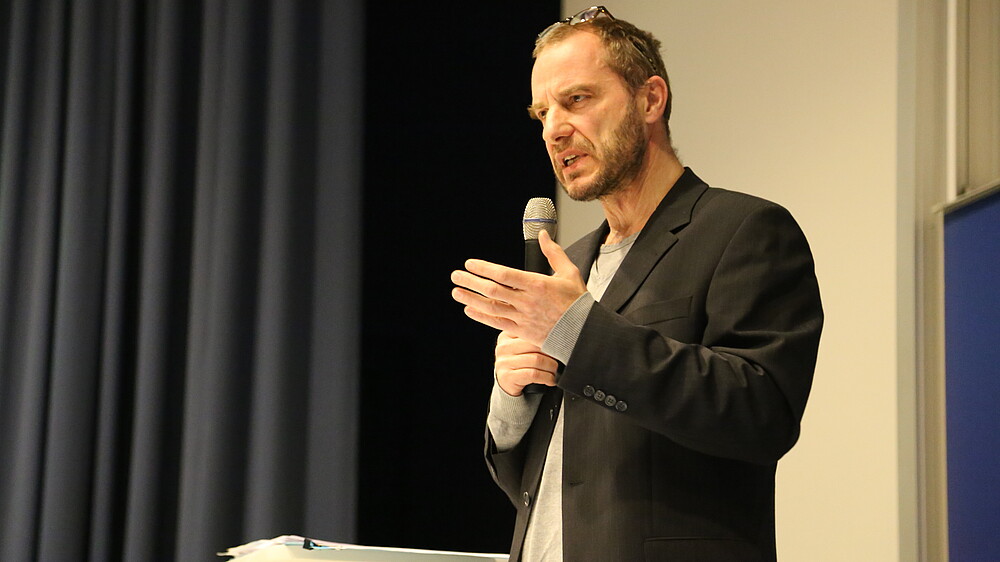Audio recording of the event on "Migration and integration in Germany and Saxony" is now online.

On April 13, 2016, the research focus "Transformation Processes in Economy and Society " held an evening event with two academic lectures on the refugee migration of recent months and its impact on public opinion, particularly in Saxony. More than 180 interested people - students and employees as well as residents of the city - accepted the invitation to the large lecture hall of the Peter-Dierich-Haus on the Zittau campus.
After welcoming words from the Rector, Professor Dr. Friedrich Albrecht, the guest speaker from TU Dresden, Professor Dr. Werner Patzelt, spoke first. The title of his speech was: "Us and the newcomers. The special experiences and perceptions of (East) Germans". In it, he summarized the processes of change of the last 25 years, which many of those present still have good memories of, in political, economic and social terms. These processes, which have not yet come to an end, particularly with regard to demographic change and its consequences, are being compounded by the challenges posed by refugee migration in recent months. All of this is causing uncertainty about the medium and long-term effects. Fear of contact with "the newcomers" could stem from the fact that there was no intensive contact with foreign residents during the GDR era. In his contribution, Professor Patzelt spoke out in favor of a public exchange and a debate on the various positions on migration and refugee policy: "Democracy can withstand such things." It should not be about unconditionally following one direction or opinion or another, but about independent reflection, including on the background to opposing positions. Professor Patzelt emphasized that politicians and journalists are also mutually dependent with regard to assumed or actual public expectations. The political scientist sees one reason for the clear resonance of the AfD in the last elections in the CDU's stronger shift towards the center. Right-wing conservative positions that had previously been represented by the Christian People's Party have been abandoned, making room for another party that is more attractive as an election party than the NPD. At the same time, the AfD's electoral successes have shown that this is not just an eastern phenomenon.
Professor Dr. Raj Kollmorgen from the Faculty of Social Sciences then spoke on the question of "Right-wing populism and hostility towards refugees: why in Saxony?". He began by making a definitional distinction between populism and extremism and then provided some statistical evidence of an increased incidence of xenophobic crimes and a more widespread acceptance of xenophobic arguments in Saxony than in the other federal states. He sees one reason for this in the trivialization of right-wing extremist actors by the state government since the 1990s. On the other hand, electoral successes with absolute majorities may have lulled the ruling CDU too much into a sense of security. In a second part, Professor Kollmorgen also addressed the influences of the mentalities that have developed over the long term in Saxony. For example, there still seems to be a tendency towards strong ruling figures and a glorification of the old monarchy, as the term "King Kurt" for the first Saxon Minister President after 1990, Kurt Biedenkopf, shows. He also considers the experiences with foreign powers inside and outside Germany, some of which were warlike, to be important, especially since the 18th century, whereby Saxony was regularly on the losing side (as in the Napoleonic Wars). This explains the stronger focus on economic prosperity and culture. This was and is combined with an intense awareness of one's homeland. It is precisely the fear of threats from foreigners, the loss of homeland and culture as well as repeated economic decline that brings the representatives of right-wing populism and extremism in Saxony such a large following, often from the middle of society.
After these two presentations, an intensive discussion ensued among the participants. Some of the questions dealt with the problem of personal information work, the advantages and disadvantages of stopping German arms exports and suggestions for a direct exchange of positions between right-wing and left-wing populists.
The information event of the research focus thus achieved one of its main objectives, namely to promote the exchange between science and the population, between young and old and between different political views and thus make a direct contribution to a living democratic culture of debate.
The lectures can be listened to as audio recordings: mediathek.hszg.de
Text: Cornelia Müller